Are Local Organic Veggies Healthier?

Environmental contaminants, including radiation, are a significant contributing factor to chronic disease and pain. Science repeatedly links toxins to chronic illnesses ranging from allergies, to autoimmunity, cancer, Alzheimer’s, and obesity. (A quick google or pubmed search reveals multiple studies linking glyphosate, the active ingredient in Roundup, to gluten intolerance, heart disease, hormone disruption, and a variety of cancers. The World Health Organization’s International Agency for Research on Cancer recently concluded that glyphosate is “probably carcinogenic to humans.”)
Our body is constantly processing these toxins by a series of chemical reactions that rely extensively on vitamins and minerals called “cofactors”. Many everyday occurrences use a substantially higher amount of cofactors for detoxification, thereby causing nutrient deficiencies beyond what a regular diet can restore. This includes daily consumption of alcohol and some pharmaceuticals. Even chronic low-grade physical or emotional stress can shift your body out of an efficient metabolic state to one that uses up to 10 times the normal amount of nutrient required to get by.
When we’re deficient in a cofactor we risk slowing down detoxification pathways, including those that are critical for survival. Many well researched theories of chronic disease suggest that in its wisdom, the body steals essential nutrients from less vital body processes in order to survive, thereby creating what we call “symptoms” in other seemingly non-related and distant areas of the body. A detoxification plan, or “detox diet”, lasting as little as 5 days and up to 6 weeks, can help to restore proper metabolism by repleting nutrient deficiencies and supporting safe toxin processing and elimination. The plan might include a variety of lifestyle suggestions ranging from exercise to eating behaviour to removal of toxin sources from your home. It might include therapies that support appropriate flow of blood and lymph in your body, and it also often includes a mixture of nutraceuticals, botanicals or homeopathics that target essential organ and tissue functions.
Many of the nutraceutical products used in a detox plan are actually ingredients called phytochemicals, which appear to be found in higher concentrations in organic compared to non-organic produce. In fact, the more stressful the natural environment of these plants, the higher the phytochemical concentration appears to be. (Most commercial varieties of produce are grown in ideal conditions that do not stimulate phytochemical production.) Phytochemicals, such as flavonoids and carotenoids, contain potent tissue healing and anti-inflammatory capacity, including through anti-oxidant mechanisms believed to slow down aging, heal radiation damage from the sun or even cell phones, and modulate cancer-causing genes in our DNA. These nutrients are active for only a short period of time in the fruit, vegetable, or herb, and lose much of their healing capacity with processing or time (e.g. while sitting on a truck for many miles).
People with serious health concerns who are considering a detoxification plan should be guided by a medical professional such as a medical or naturopathic doctor. Other supportive health professionals who can also really make a difference in the effectiveness of your plan include Building Biologists who identify sources of toxin exposure in your home or work place, holistic nutritionists, or counsellors, meditation instructors, and other persons qualified to support you in an exploration of emotional connections to physical health.
*If you missed signing up this season for a CSA share from one of our many local farms, you can still enjoy Sunday mornings at the Memorial Centre Farmers’ Market.